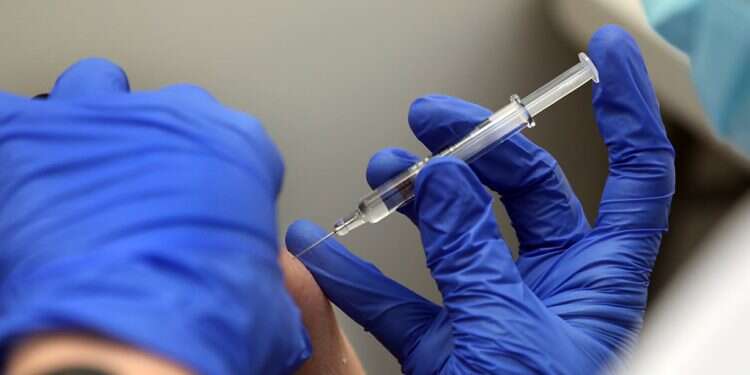Defense Minister Benny Gantz called the Israel Institute for Biological Research a "source of national pride" during a visit to the IIBR on Monday to unveil the institute's COVID vaccine, which is slated to begin clinical trials by the end of October.
Director of the IIBR Professor Shmuel Shapira announced the name of the new Israeli vaccine: Brilife (pronounced bree-life).
Follow Israel Hayom on Facebook and Twitter
Gantz took a tour of the institute and was given an overview of the final preparations underway before clinical trials can commence, the timetable, and the work to produce the vaccine. He also met with the research team that worked on the vaccine and congratulated them on their mission.
At the end of the visit Gantz said, "We are at a very important point. Professor Shapira and the entire team have done fantastic work. They are the scientific vanguard of the State of Israel and they have brought the vaccine to the point at which we can soon start clinical trials. If that process succeeds, it will be wonderful news for Israel and possibly the rest of the peoples of the world."
Shapira said, "We started out nine months ago, on Feb. 2, and at the end of October we will be facing the final hurdle."
Shapira explained the significance of the vaccine's name: "Bri, from "bruit" [health], "il" for Israel, and life."
Despite the optimistic outlook for a locally-developed vaccine, Israel's national battle to contain the spread of COVID continues to encounter snares.
Channel 12 News reported on Monday that over the past few days, dozens of Israelis who have never been tested for COVID have received messages from the Health Ministry mistakenly informing them that they tested positive, while actual confirmed carriers were not notified and did not quarantine themselves.
The Health Ministry explained the problem as a "failure of a hospital computer system that returned erroneous results. The problem was addressed the same day."
Meanwhile, Tuesday morning saw a slight increase in the number of new confirmed cases in a 24-hour period, after some 40,000 tests resulted in 1,479 positives, the Health Ministry reported.
The percentage of positive tests stood at 3.7%, compared to 3.5% on Sunday.
Three more COVID patients succumbed after midnight Monday, bringing Israel's death toll from the virus since the start of the pandemic to 2,268.
Subscribe to Israel Hayom's daily newsletter and never miss our top stories!
As of Tuesday morning, 1,125 COVID patients were hospitalized nationwide, including 634 listed in serious condition. Of those 634, 239 were on ventilators. There were a total of 23,347 active or symptomatic patients. At the peak of the second wave in early October, there were some 68,000 active cases in Israel.
Jerusalem had the most COVID cases (3,066), followed by Bnei Brak (1,803). Tel Aviv-Jaffa had 890 cases; Ashdod had 857, and Modi'in Illit had 789.
In related news, the Corona cabinet was scheduled to convene on Tuesday to discuss lifting more public health restrictions put in place as part of the second lockdown.
One proposal on the table is to open shops and shopping centers and postpone sending first to fourth-grade students back to school.
An official close to the negotiations told Israel Hayom on Monday that "there is no way of taking two steps at one."
According to the official, the possibility of keeping the lower grades out of school for longer than planned has to do with the time the Education Ministry needs to prepare schools and teachers to re-open. The cabinet was also due to discuss a framework for sending Haredi students back to yeshiva in small groups.
On Tuesday, thousands of yeshiva students and teachers were undergoing testing. If the results are negative, they will be permitted to return to yeshiva. Students or rabbis who contracted COVID but recovered will be asked to present documentation from their community medical official attesting to their health status.
The tests were being conducted by Magen David Adom at some 18 testing stations in Haredi enclaves.
Late Monday, national coronavirus coordinator Professor Ronni Gamzu asked the ministers in charge of areas under lockdown to lift the closure in a few cities coded red under the stoplight plan, as well as some neighborhoods in Jerusalem, given the improvement in their numbers of new confirmed cases. The ministers approved the removal of lockdown for the Haredi community Rechasim, outside Haifa. On Tuesday, the committee was slated to discuss other cities, including Modi'in Illit, Betar Illit, and the Jerusalem neighborhood of Mattersdorf.




